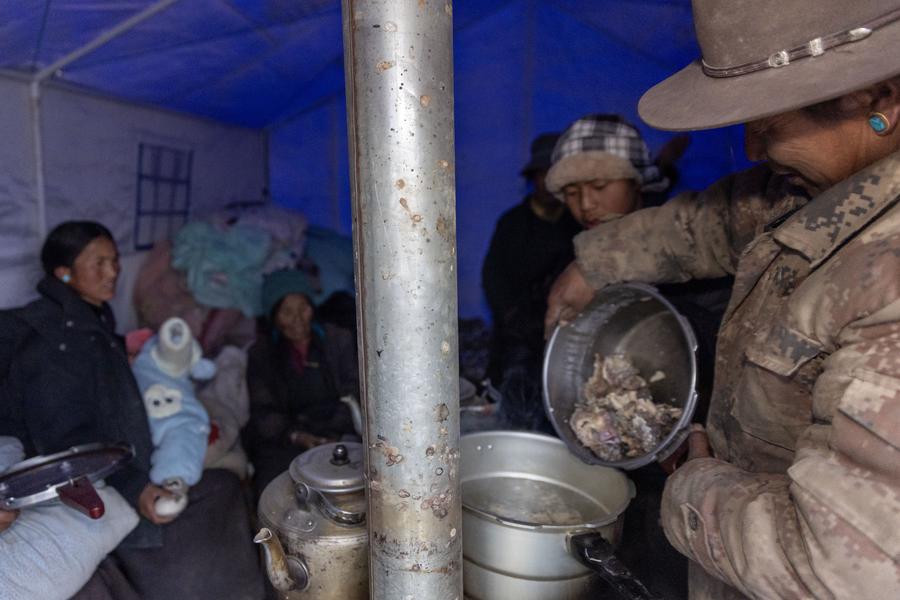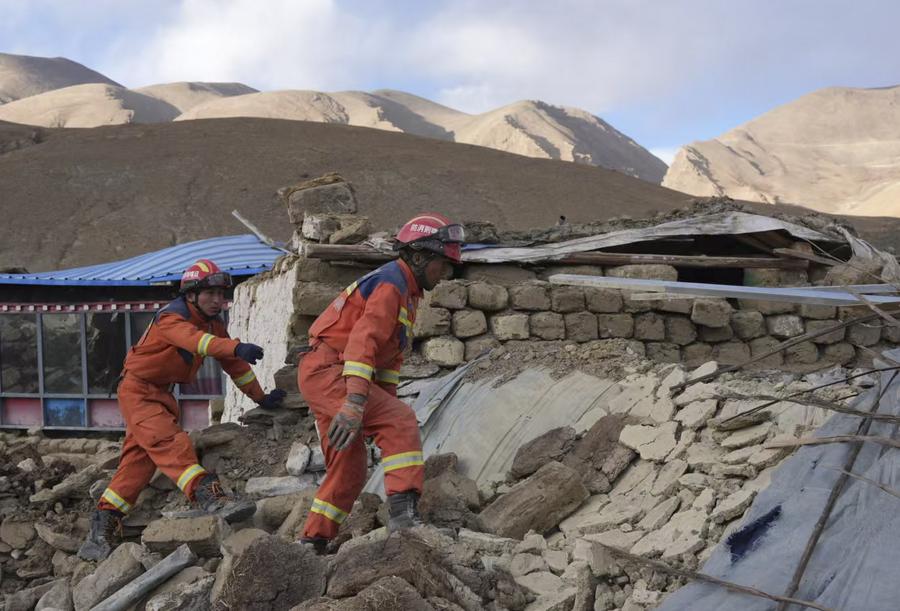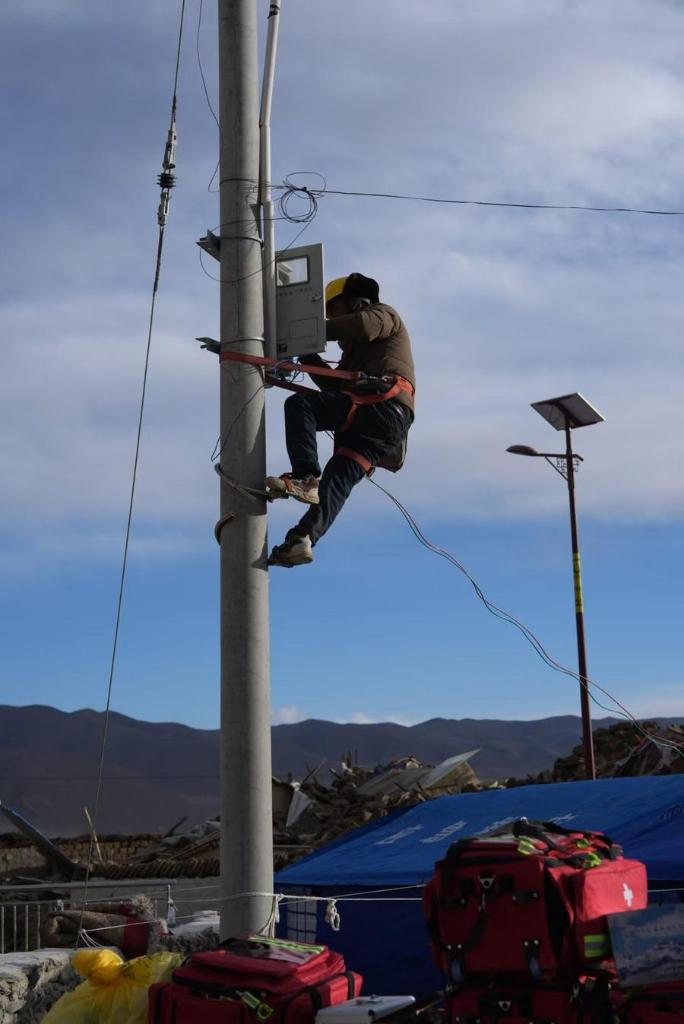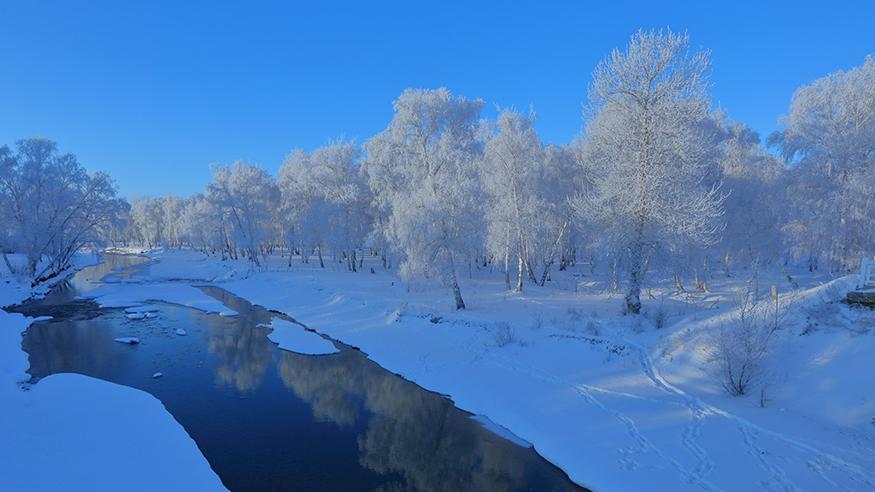Xizang quake kills 126, all-out rescue effort underway

Earthquake-affected residents cook dinner in a tent at a village in Xigaze, southwest China's Xizang Autonomous Region, Jan. 7, 2025. (Xinhua/Jiang Fan)
LHASA, Jan. 7 (Xinhua) -- A total of 126 people have been confirmed dead and 188 others injured after a 6.8-magnitude earthquake jolted southwest China's Xizang Autonomous Region on Tuesday morning, toppling thousands of rural houses on the northern slope of the Himalayas.
The earthquake struck at 9:05 a.m. (Beijing Time), with the epicenter located in Tsogo Township, Dingri County, in the city of Xigaze. There are 27 villages and approximately 6,900 people within a 20-km radius of the epicenter.
A preliminary survey shows 3,609 houses have collapsed, said the city government of Xigaze, adding that 407 trapped people have been rescued and over 30,000 affected residents have been relocated.
The search for trapped victims is ongoing. Rescuers are also racing against time to set up tents for relocated residents in an area where temperatures are forecast to drop to minus 17 degrees Celsius.
In Tsogo Township at the epicenter and the worst-hit Chamco Township, Xinhua correspondents saw many toppled houses and residents staying in open spaces for safety.
"The first shock wave struck before dawn, and it made lights and furniture shake," said 49-year-old Pasang Tsering, a villager from Metog Village in Tsogo. "Then came a second and stronger one, so I dashed outside immediately," he recounted to Xinhua.
"I've never seen an earthquake this big before," another villager named Pasang said while clearing house debris. "We're now most concerned with where to spend the night. The village has some spare tents, and officials said more are on the way."
Tsering Phuntsog, Party chief of Gurum Village in Chamco, lost his 74-year-old mother, and several other family members remained buried in debris. The village with 222 residents reported 22 deaths, including 11 children, he said, adding that all the houses in the village were damaged.
"Even young people couldn't run out of the houses when the earthquake hit, let alone old people and children," said Tsering Phuntsog.

Rescuers work at a village in Dingri County in Xigaze, southwest China's Xizang Autonomous Region, Jan. 7, 2025. (Xinhua/Jigme Dorje)
ALL-OUT RESCUE EFFORT
China's response to strong earthquakes usually features a massive mobilization, with national, provincial and local governments deploying rescuers and funds to the quake-hit area.
Chinese President Xi Jinping on Tuesday ordered all-out rescue efforts to save lives and minimize casualties. Vice Premier Zhang Guoqing has led a team to the quake site to guide the rescue and relief efforts.
China's central authorities have dispatched some 22,000 disaster relief items to the quake-hit region, including cotton tents, winter coats, quilts and folding beds, together with special relief materials for high-altitude and frigid areas.
The earthquake emergency response in Xizang has been raised to level I, the highest one, the region's emergency command center announced on Tuesday.
The region has deployed more than 12,000 rescuers, including fire fighters, soldiers, police officers and professional rescuers, to the quake site.
The Ministry of Finance and the Ministry of Emergency Management said they allocated 100 million yuan (about 13.9 million U.S. dollars) to support disaster relief efforts in Xizang. The National Development and Reform Commission also allocated 100 million yuan to support post-disaster emergency recovery.
The Red Cross Society of China has initiated an emergency response to send 4,600 items of relief supplies to the quake-affected areas, including cotton tents, quilts, insulated jackets and folding beds.
Xinhua reporters in Gurum Village said the resettlement site, located in the farmland next to the village, has set up 15 tents, which can accommodate all the affected people and have sufficient quilts, food and water.
As of 6:08 p.m., telecommunications had resumed in the three hard-hit townships near the epicenter, said the Xizang branch of China Mobile.

A staff member repairs electrical facilities at a village in Dingri County in Xigaze, southwest China's Xizang Autonomous Region, Jan. 7, 2025. (Xinhua/Jigme Dorje)
WHERE IS DINGRI?
The county of Dingri has a population of over 61,000 and is one of the most populous border counties in Xizang.
It lies on the northern slope of the Himalayas, bordering Nepal to the south. With an average altitude of 4,500 meters, Dingri is home to the northern base camp of Mount Qomolangma, the world's highest peak.
The Mount Qomolangma scenic area has been temporarily closed, and tourists and staff members are in a safe condition, according to the Dingri Culture and Tourism Bureau.
No damage has been reported so far in Tashilhunpo Monastery, Panchen Rinpoche's traditional seat, in the city of Xigaze, where the tremor was felt.
According to the weather forecast, Dingri will experience mostly sunny weather over the next three days, with the temperature ranging between minus 17 and 8 degrees Celsius.
Photos
Related Stories
- Brave student honored for courageous act during earthquake
- All-out rescue efforts underway following Xizang 6.8-magnitude quake
- Backgrounder: Basic facts & figures about epicenter of 6.8-magnitude quake in Xizang
- Mount Qomolangma scenic area closed after 6.8-magnitude quake hit Xizang
- Casualties reported in 6.8-magnitude quake in Xizang
Copyright © 2025 People's Daily Online. All Rights Reserved.









